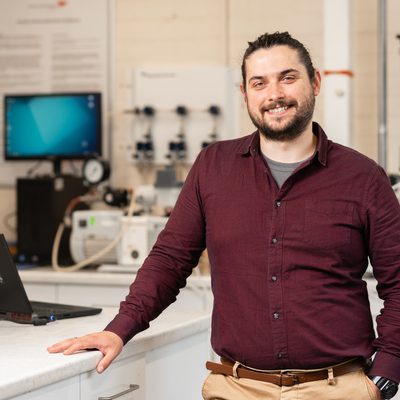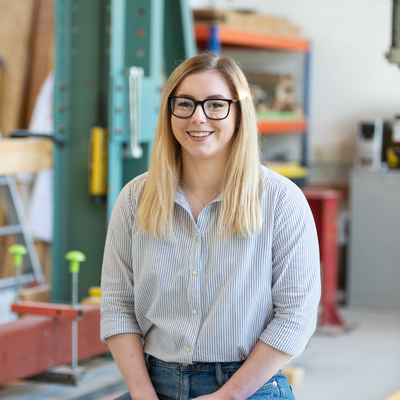Students past and present share their experiences of studying MSc Advanced Structural Engineering.
2020 Graduate, Bartosz Belch, talks about his experience on Edinburgh Napier's Advanced Structural Engineering course.

Tell us a bit about yourself
I studied Civil Engineering in Poland and graduated during 2016, but I never had the chance to work as an engineer. In 2018, I moved to Edinburgh and decided to try a Masters in Engineering. I did it because I wanted to raise my qualification as an engineer, improve my English skills and get a Master’s diploma from a UK University. I chose Edinburgh Napier in 2019 because the Advanced Structural Engineering course was the most appealing to me, and ENU has a great employability rate for their graduates.
What made you decide to study Structural Engineering?
I enjoy Maths, Physics and the rewarding feeling of solving complex problems. Calculating and designing structures is my way of contributing to society and helping others. It’s a great feeling to see structures I have designed in real world, and as an international student I appreciate the fact that mathematics and equations are a universal language that any engineer understands, so there are no language barriers in the workplace.
Has your course given you any practical opportunities?
During my course, I joined the BEX (Built Environmental Exchange) placement, where I got help finding an industrial partner to work with during my dissertation. Thanks to that placement, my dissertation was able to address real industry needs for research. As a direct result of BEX, I also got a scholarship which paid off my student loan. Even though my course only lasted for 1 year, I would recommend the placements and internship opportunities to everyone.
How have you found the facilities? How have you used them?
The Merchiston campus facilities are well equipped, especially the Jack Kilby Computing Centre (JKCC). I used it for general study and to work on my degree assessments very often.
What have you gone on to do after your studies?
After graduation in 2020, I chose to work at Edinburgh Napier as Structural Engineer and Research Assistant that specialised in Mass Timber. I create designs and run calculations for various structures, but I also participate in new research projects which makes the job very versatile and interesting.
What advice would you give to anyone considering a Civil Engineering course?
The MSc Advanced Structural Engineering course is great. I would recommend it to anyone who would like to understand how the world around you works, and I am confident that you will be fascinated by the course content that’s on offer.
Recent Graduate Louise explains why Edinburgh Napier was the clear choice for her Masters journey.

What made you decide to do your Masters?
I’d always anticipated doing a Masters at Edinburgh Napier, while I was doing my undergraduate here. Originally I’d planned to be on the Masters of engineering, but I realised I wanted to do a Masters of science, specifically, advanced structural engineering. During my undergraduate I did loads of lab experiments, which I really enjoyed, and thought, this is something I want to do more of. I wanted a career where I could really take all I’d learned over my studies to develop these skills.
How did you feel when you received your offer?
When I got my offer, I was really delighted. All the work I’d put in over the last 4 years had paid off, and I couldn’t have been happier, to be honest.
What was your first day like?
On my first day of the course, my Programme Leader, who was my first lecturer, really put us at ease. She explained what was expected of us throughout the course of the year, and how things were going to come together. If we had any questions, she was totally approachable and made me feel completely comfortable with starting a new year.
What has been the highlight of your Masters?
During my Masters I got the opportunity to become a Bex scholar. The built environment exchange (Bex) looks to provide students with the knowledge to contribute to a more sustainable environment. We get all sorts of opportunities, like internships and trips, for example, we went to the Falklands Estate to look at the sustainable community they were building there. Becoming a Bex scholar during my Masters has, in my opinion, changed my life. It’s given me so much experience, through internships that I could take to industry with me that had I been to another University I don’t think I would have been able to get.
What kind of support have you received during your Masters?
At the beginning of my Masters I was getting a bit overwhelmed, and I was having a few self doubts. I went to see one of my lecturers that I know quite well and expressed to him some of my concerns, and he completely reassured me that I was completely capable of completing my Masters and completing it well, and here we are today – much happier. During a Masters, there’s no doubt that things can get on top of you, but after having that conversation with my lecturer and the reassurance he gave me, made me have more belief in myself that I could in fact complete it.
What would you say to someone thinking about starting a Masters?
I really feel that a Masters is a fantastic way to specialise in an area you’re interested in. Previously my expertise was in civil engineering which is a very broad subject, but specialising in my Masters in structural engineering allows me to really get in to the nitty gritty of the stuff I enjoy.
Aside from your studies, what else have you enjoyed about being an Edinburgh Napier student?
One of the reasons why I wanted to carry out my Masters at Edinburgh Napier was because it’s in Edinburgh. There’s nowhere in the world the with that cultural diversity, and the people are so friendly.
During my time carrying out my Masters I’ve been given so many amazing opportunities, particularly with sport. I’m now a team Scotland Olympic weightlifter, which would not have happened if I hadn’t been accepted to do my studies here, which I’m incredibly grateful for.